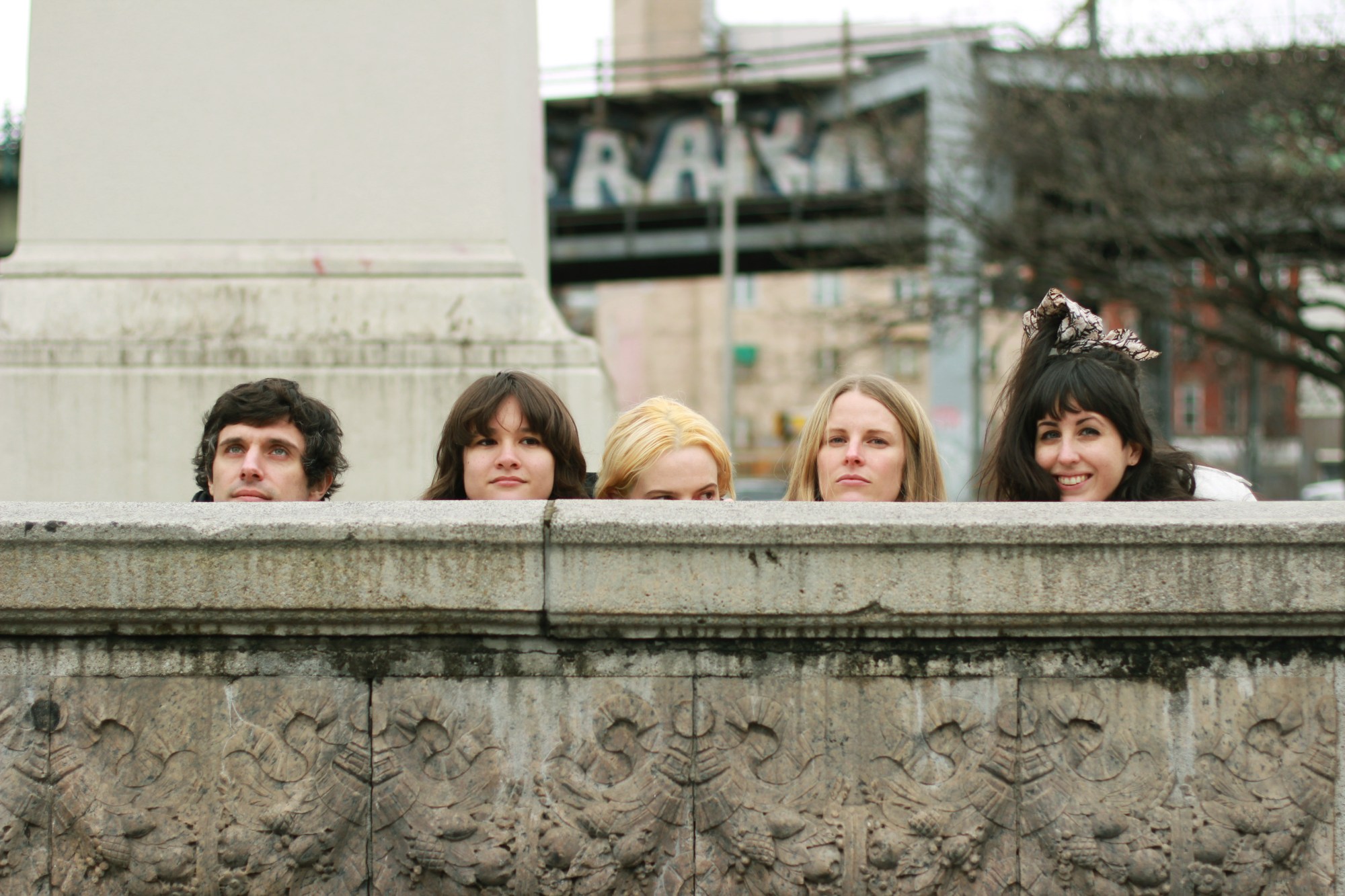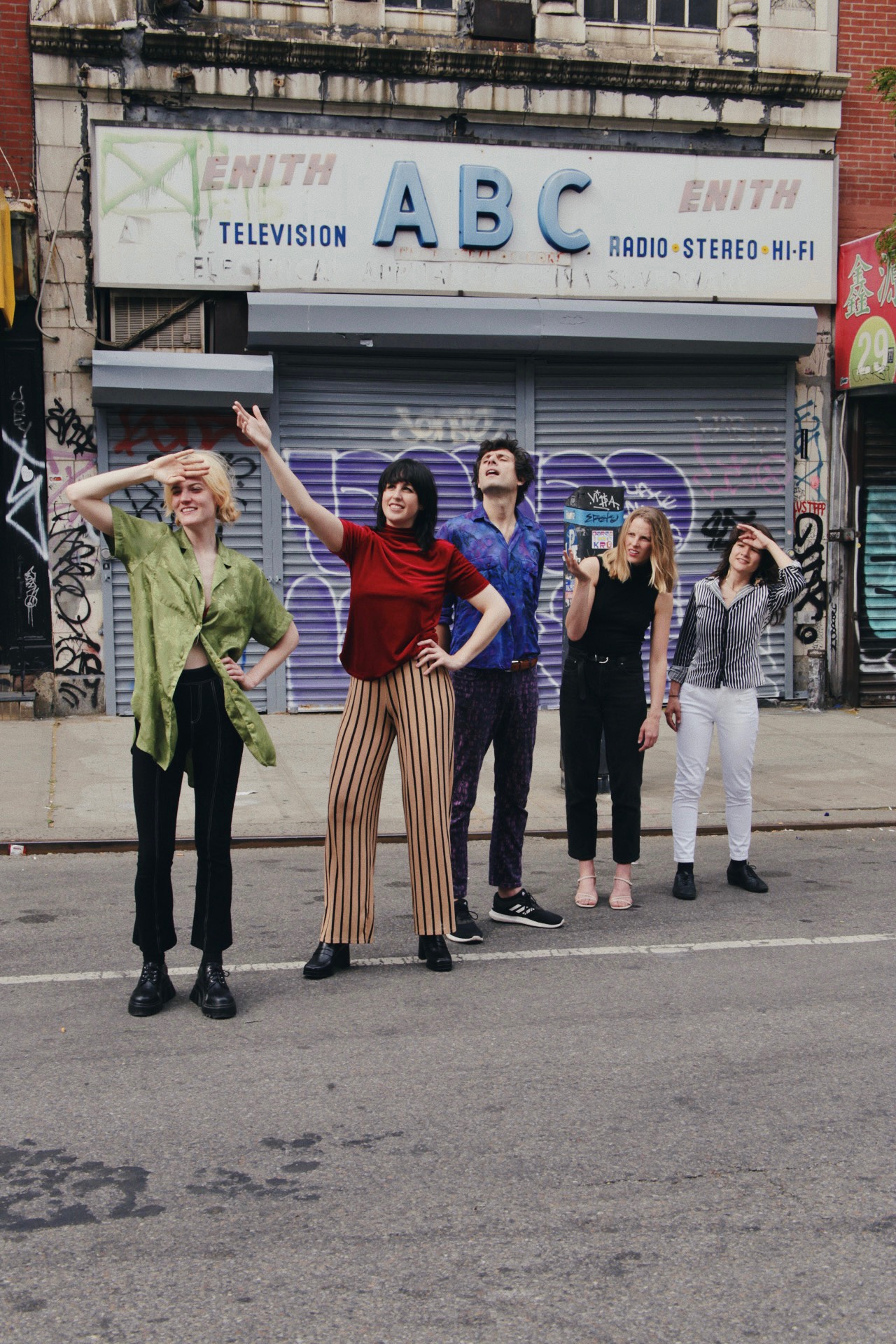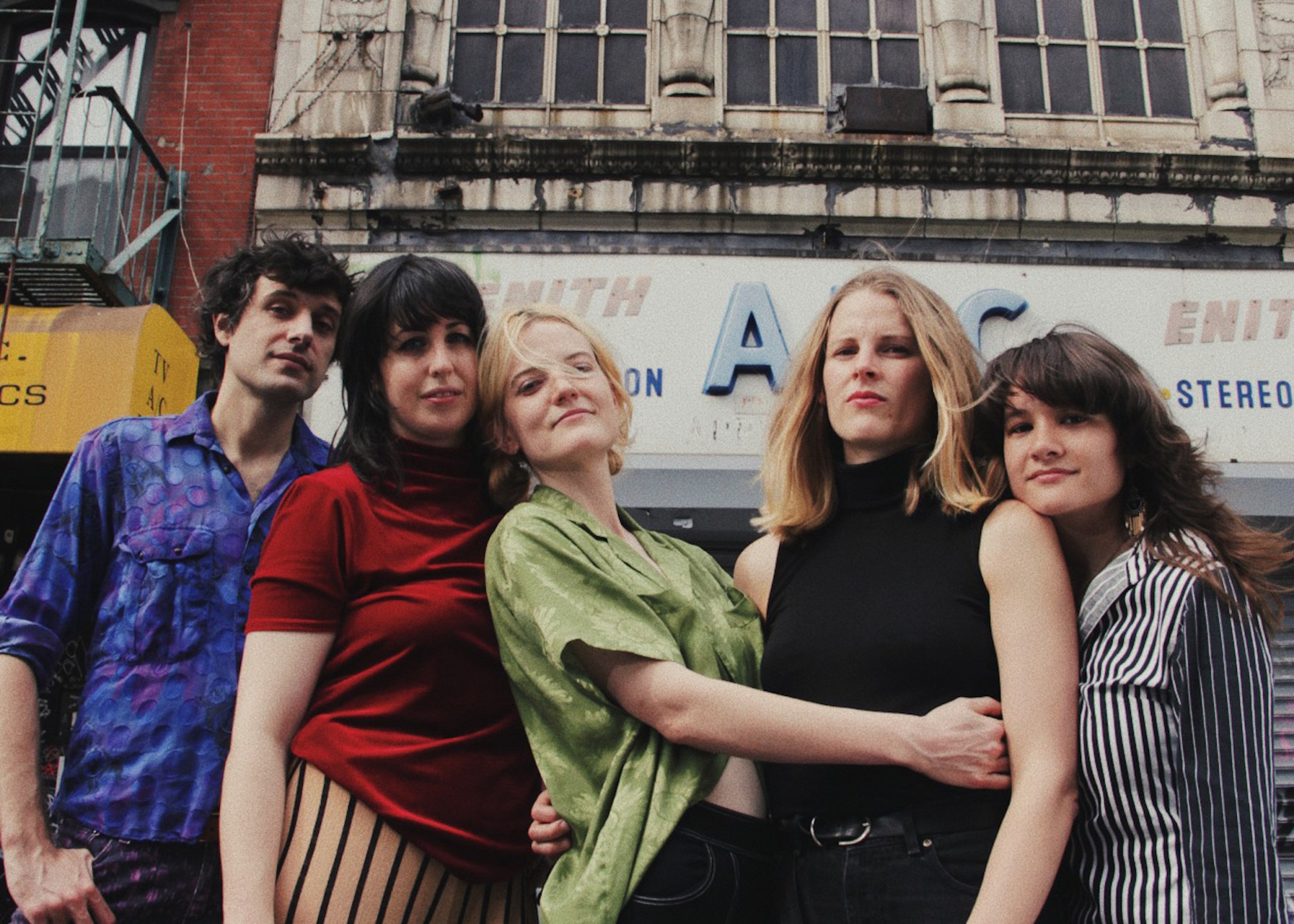The members of Brooklyn’s favorite art punk band Gustaf picked up some off-the-cuff hobbies during lockdown. Guitarist Vram Kherlopian began playing online chess with strangers, while lead singer Lydia Gammill tried her hand at making homemade paper. “I wanted to close the recycling cycle, but now I have all this shredded paper that I don’t want to make into paper anymore because it takes too long,” she admits with a sigh. “I left the pulp soaking too long and now it has a… specific smell.”
The domesticities that kick off our interview are a far-cry from what one might expect from one of New York City’s most exciting pre-pandemic live acts. As the world continues to re-open around us, Gustaf — composed of Lydia, Vram, bassist Tine Hill, vocalist/percussionist Tarra Thiessen and drummer Melissa Lucciola — are getting back on the saddle in a big way. The raucous quintet, which made a name for themselves in the Brooklyn scene with punchy guitar distortions and hard drums, anchored by Lydia’s carefree drawl, are at long last formally releasing their debut studio album.
Audio Drag For Ego Slobs (out October 1 via Royal Mountain Records) is part-bastardisation of a Laurie Anderson quote and part-dig at the pretentious music crowd. Their particular sound harkens back to the Yeah Yeah Yeahs and The Kills’ heyday in the early 00s and to femme-punk idols The Raincoats. The record, produced by Lydia alongside Carlos Hernandez of Mr Twin Sister and Ava Luna, is a calling card and a channeling of the raw live energy that entrenched them so deep in the hearts of the contemporary punk scene. Not bad for a group that jokingly refers to itself as “a glorified T-shirt company and an Instagram account”.

“When we first started as a band, I liked as an umbrella term for what our music explored in a way: that technical element of a pitched down vocal pedal,” Lydia says. “An ‘ego slob’ is the translation of the outside world within the context of yourself and being messy doing it. It’s a point of view that’s trying to skewer the unproud, cathartic emotions within all of us.”
From the droning repetitions and chugging rhythm of the bass on “Dream” to the firestorm of guitar on first single “Mine” (and the Hole-esque visual world in its accompanying music video), Gustaf prove themselves a time capsule of the sweaty nights we miss. On standout track “Cruel”, Lydia nonchalantly snarls: “You’re not giving me a chance to feel all right / I wanna feel alright”. She captures something essential here, and drives home that Gustaf does what all great punk music should do: challenge the pessimism around us, get us up off our asses and stir up a good mosh pit.
Ahead of the album’s release, Gustaf told us all about building themselves up as a live band, getting back on the road with IDLES and Pillow Queens, and the making of Audio Drag For Ego Slobs.
When I listen to you guys I think a lot about the bands that were in Williamsburg back in the 00s. Do you think of yourself in that lineage?
Lydia Gammill: Oh, my gosh, I remember when [Meet Me in the Bathroom] came out, there were too many people in the scene who were idolising it in a way. There’s a lot of different moments when you’re coming up and you look at what everyone else is doing and you’re like, “Someday I’ll be one of you.” It has been fun to slowly watch all that kind of accumulate and manifest in a way where we’re now doing the stuff that was just a dream a decade ago.
Is it crazy to now be releasing music after quietly building a following from live performances the past few years?
Vram Kherlopian: It just feels awesome to have something that we’re happy with and that we’re ready to share with people. I’m stoked about that. Just happy to have music to send to mom and other people.
LG: Because of the pandemic, we’ve only played like one or two shows for the release. You just kind of had to have people who knew what we were doing show up. We’ve all been in a lot of other bands, so it’s not like we were just starting from scratch. We were able to get shows because of the connections we had built over the years. But I mean… you only have one shot at your first shot, so I think it was important to take the time to figure out who we were and what we were doing before we totally burst onto the internet forever.
I was surprised that the album’s name is meant as a dig toward a very specific kind of pretentious, plastic music person. The music itself is real fast-paced and punchy punk — anything but fake.
LG: I don’t necessarily think the narrator of the songs is right. It’s just been sort of a fun way to try and explore those points of emotional catharsis and hyperbole. I think we all sort of have points where you feel indignant or you feel victimised and you’re not really. It’s important to maintain a sense of humour with everything, if that’s possible. That was the band’s attempt to try and inject a silver lining on the selfishness of some of the music.
What song was the most challenging to work on? What was the most fun?
Tine Hill: We recorded the album like six times! In California and then Marfa…
VK: There are three songs on this album that we never really played live: “Best Behavior”, “Dog” and “Hope You’re Happy”. Not that those were necessarily difficult, I just feel like they had the most unanswered questions going into it, which was really fun.
Tarra Thiessen: I feel like “Package” was hard to translate the energy from the live show.
LG: Getting “Hope You’re Happy” to hit post-production took a lot of massaging and figuring out how to get the flow to land in the right way. “Best Behavior”, I thought actually was pretty interesting. There were a lot of questions going into it. But after the first day of arranging it, the balance that we had was pretty close to what ended up coming out on the record. Once Vram came with his guitar, it stayed pretty untouched till the end.
Melissa Lucciola: That song was born in the studio.

This record is very much charged with energy that’s meant to be heard at a live show. It’s extremely active.
LG: It was definitely a challenge to the recording process that was hovering over our heads. It seemed like everyone thought it should sound a specific way. It was important to us to try and make something that lived up to people’s expectations, but also gave them something unexpected. It was important to translate that, and it’s hard because things read in your headphones very differently than in the live environment.
I know you have a few live shows coming up with IDLES. As a band that made their audience through live shows, and amidst the ongoing pandemic, are you ready to hit the road?
VK: I’m looking forward to playing shows again. I guess I’ve just been conditioned to last year and a half to just expect things to not happen.
LG: We’re all going to be starting the tour. We don’t know if we’re going to be finishing all the tours. Like that’s the vibe I get.
A band touring in the apocalypse is a big vibe… with the future so uncertain, where do you see the future of the band?
LG: We’ll hopefully figure out the second record after the tour.
VK: There’s still work and songs to be done. I’m just really ready to play music again. Ready to get out of the house.

